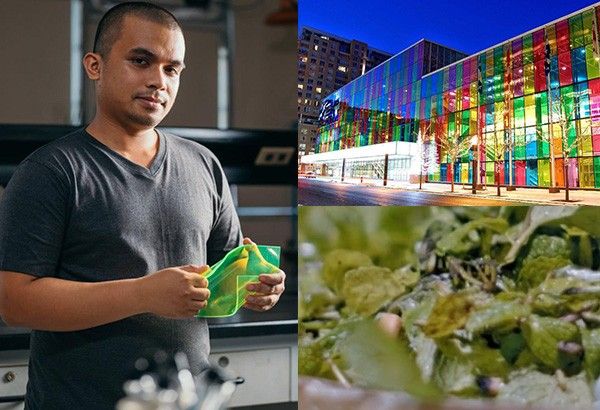Pinoy wins international award for turning rotten food into renewable energy

MANILA, Philippines — Mapua University Manila student Carvey Ehren Maigue put the Filipino genius at the centerstage again.
The 27-year-old native of Binangonan, Rizal bested 1,800 entries from around the world by winning the first James Dyson Awards for Global Sustainability, an international design competition for engineers from more than 30 countries.
Maigue created AuREUS, a renewable energy system for windows and building walls. Unlike solar power which relies on the sun alone, AuREUS gets its energy from the bioluminescent compounds found in rotting fruits, vegetables and crops damaged by natural disasters. The system absorbs the sun’s UV lights and transforms them into electricity.
AuREUS does its job even without exposure to the sun’s heat.
According to Maigue, he came up with the invention to help people have better access to clean and renewable energy.
"Solar energy 'yung pinagtuunan ko kasi sa tingin ko maganda kung magagamit natin ang likas na yaman na ito," he said in a video interview posted on Dyson's website.
"Kahit maulap at maulan, meron pa rin ultraviolet light na napupunta sa atin. Sayang, 'di natin nagagamit ang enerhiyang ito sa conventional na solar panel at iyan ang nais solusyunan ng aking imbensyon."
He reportedly took his inspiration from the northern lights. Food and vegetable particles are suspended in a resin substrate. These particles absorb and release light along its edges when sunlight hits them. The captured light is turned into electricity.
James Dyson, the awards' founder and the company's Chief Engineer, said he was impressed not only at how AuREUS “makes sustainable use of waste crops,” but at the Filipino inventor’s “resolve and determination.”
Maigue, who went home with US$39,972, describes winning the award as a beginning and end. It is the end of “ years of doubting whether my idea would find global relevance.” It is the beginning “of the journey of finally bringing AuREUS to the world.”
In his Facebook post, he said he hopes his invention will let students and teachers in the Philippines “feel that their efforts are not in vain, that there is a chance, and it is very possible that one or more of their students could be the next inventor designer, writer, leader, musician, scientist, creator – that would create a positive change in our world.”
He urged everyone to keep on fighting because things are possible.
"I want to work on the ways I can bring the product to the market immediately but also much of it will be dedicated to more research and development. I want to create threads and fabric so that even your clothes would be able to harvest ultraviolet light and convert it into electricity," he told Dyson on his next moves after winning the award.
"We are also looking to create curved plates, for use on electric cars, aeroplanes and even boats. AuREUS has the chance to bring solar energy capture closer to people. In the same way computers were only used by the government or the military and now the same technology is in our smartphones, I want solar energy harvesting to be more accessible."
The award is ran by the James Dyson Foundation, which is behind the popular Dyson brand of manufactures found in over 65 countries around the world. The award aims to motivate and inspire tomorrow’s design engineers and is part of the company’s goal of making the young all fired up about design engineering.



















